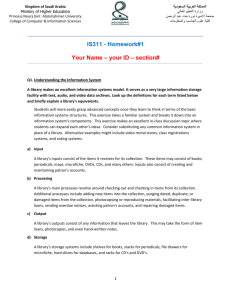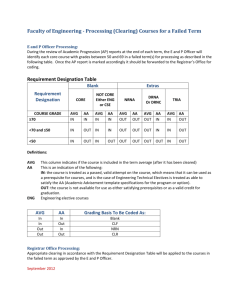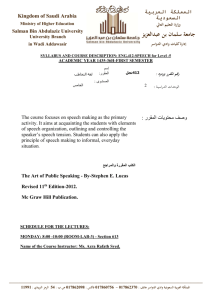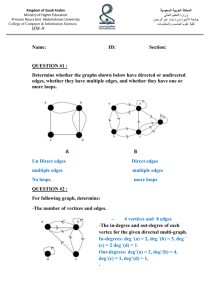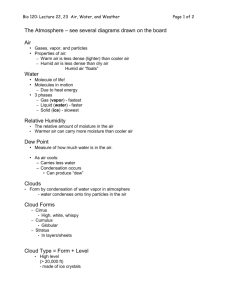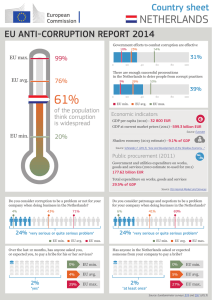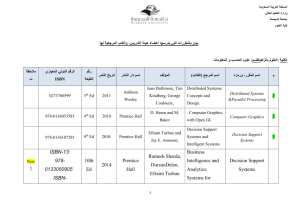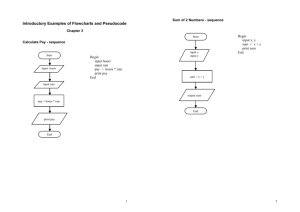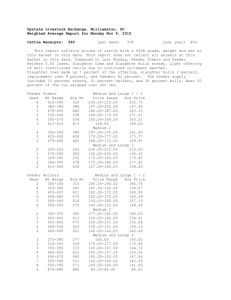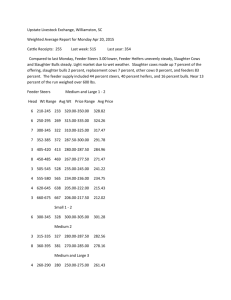342 - موقع كلية الحاسب
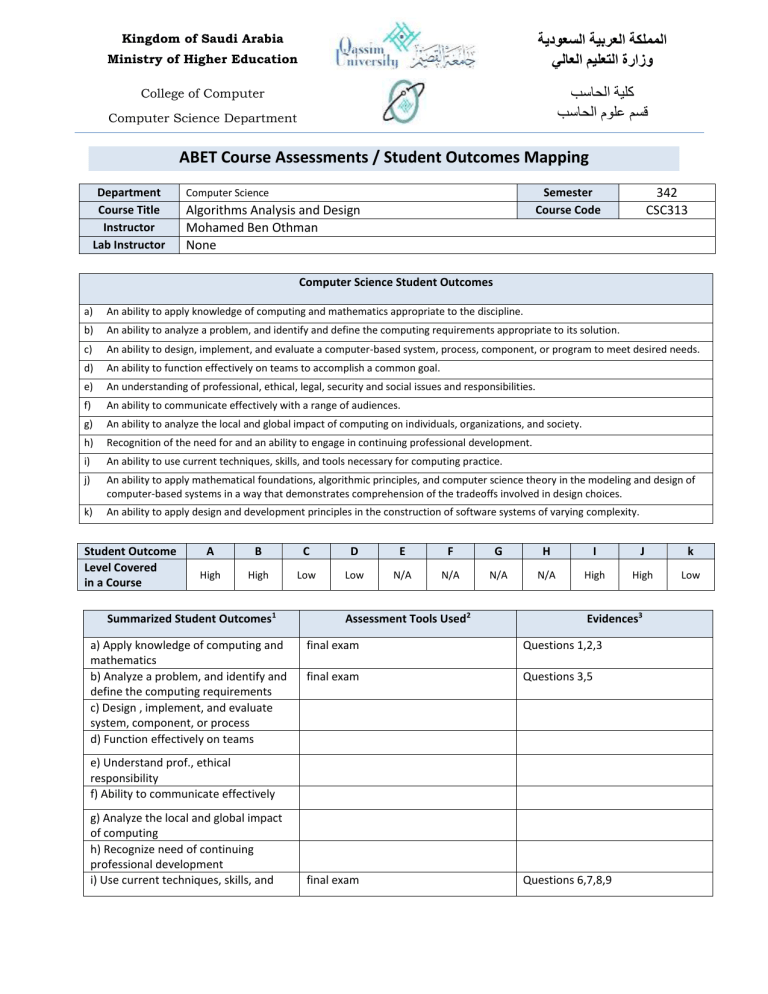
Kingdom of Saudi Arabia
Ministry of Higher Education
College of Computer
Computer Science Department
ةيدوعسلا ةيبرعلا ةكلمملا
يلاعلا ميلعتلا ةرازو
بساحلا ةيلك
بساحلا مولع مسق
ABET Course Assessments / Student Outcomes Mapping
Department
Course Title
Instructor
Lab Instructor
Computer Science
Algorithms Analysis and Design
Mohamed Ben Othman
None
Semester
Course Code
342
CSC313
Computer Science Student Outcomes a) An ability to apply knowledge of computing and mathematics appropriate to the discipline. b) An ability to analyze a problem, and identify and define the computing requirements appropriate to its solution. c) An ability to design, implement, and evaluate a computer-based system, process, component, or program to meet desired needs. d) An ability to function effectively on teams to accomplish a common goal. e) An understanding of professional, ethical, legal, security and social issues and responsibilities. f) An ability to communicate effectively with a range of audiences. g) An ability to analyze the local and global impact of computing on individuals, organizations, and society. h) Recognition of the need for and an ability to engage in continuing professional development. i) An ability to use current techniques, skills, and tools necessary for computing practice. j) An ability to apply mathematical foundations, algorithmic principles, and computer science theory in the modeling and design of computer-based systems in a way that demonstrates comprehension of the tradeoffs involved in design choices. k) An ability to apply design and development principles in the construction of software systems of varying complexity.
Student Outcome
Level Covered in a Course
A
High
B
High
Summarized Student Outcomes 1
C
Low
D
Low
E
N/A
F
N/A
Assessment Tools Used 2
G
N/A
H
N/A
I
High
J
High
Evidences 3 k
Low final exam Questions 1,2,3 a) Apply knowledge of computing and mathematics b) Analyze a problem, and identify and define the computing requirements c) Design , implement, and evaluate system, component, or process d) Function effectively on teams e) Understand prof., ethical responsibility f) Ability to communicate effectively g) Analyze the local and global impact of computing h) Recognize need of continuing professional development i) Use current techniques, skills, and final exam final exam
Questions 3,5
Questions 6,7,8,9
Kingdom of Saudi Arabia
Ministry of Higher Education
College of Computer
Computer Science Department
Summarized Student Outcomes 1 tools j) Apply mathematical foundations, algorithmic principles, and computer science theory k) Apply design and development principles
Assessment Tools Used 2 final exam
ةيدوعسلا ةيبرعلا ةكلمملا
يلاعلا ميلعتلا ةرازو
بساحلا ةيلك
بساحلا مولع مسق
Evidences 3
Questions 6,7,8,9
1 Please refer to “CS Course-to-Student-Outcomes Mapping” for the list of outcomes to measure for
each course. For a full description of the outcomes, please see the table below.
2 Possible Assessment Tools: Midterm Written Exam, Final Written Exam, Quizzes, Integrative Projects,
Participation in Lectures, Use of Computer Facilities by Students, Team Work, Practice in the Lab,
Homework, Team Work, Illustrative Presentations, Written Reports. Add other assessment tools as
necessary.
3 Evidences: For each assessment tool used for measuring an outcome, please provide evidences that show HOW the outcome is measured/achieved. For example, for written exams, evidence can be particular question measuring a particular outcome. Provide evidences in separate sheets (if needed).
Kingdom of Saudi Arabia
Ministry of Higher Education
College of Computer
Computer Science Department
ABET Course Assessment Report: Notes
ةيدوعسلا ةيبرعلا ةكلمملا
يلاعلا ميلعتلا ةرازو
بساحلا ةيلك
بساحلا مولع مسق
1Any exam should mention explicitly which question(s) covers which of program outcome(s) described in
ABET Course assessments/Program outcomes mapping table
like [ABET
Program outcomes C].
2Only the outcomes covered by the course should be included.
3Only course assessments covering the outcomes should be included.
4The avg field is the average marks of all students in the correspondent assessment/outcome.
5The Total field is the total mark allocated to the part covering the outcome in the assessment.
6The average is the total results of the students over the number.
7The total is the total marks allocated to the questions covering the outcome.
8Total avg result is
100∗∑ 𝑎𝑣𝑔
∑ 𝑡𝑜𝑡𝑎𝑙
% .
9 The performance is specified using the following Rubrics: Exemplary (>=90%, *****), Proficient
([72%, 90%[, ****), Apprentice ([52%, 72%[, ***), Novice ([32%, 52%[, **), Weak (<32%, *).
10Depending on the performance field results fill in the Strengths, Weaknesses and proposed
Actions.
11Update course assessments to include only those covered by the course. All and only the course assessments covered by the course should be added. Only the course assessments covering outcomes should be put in the second table (report). The following table gives some examples of course assessments: Midterm Written Exam, Final Written Exam, Quizzes, Integrative
Projects, Participation in Lecture, Use of Computer Facilities by Students, Team Work, Practice in the Lab, Homework, Team Work, Illustrative Presentations, Participation in Lectures,
Written Reports.
ABET Course Assessments / Student Outcomes Report
OUTCOME A B C D E F G H I J K
Covering
Level
Result final exam
Total Avg. Result
Performance
High High Low Low N/A N/A N/A N/A High High Low
Result Result Result Result Result Result Result Result Result Result Result
Avg Total Avg Total Avg Total Avg Total Avg Total Avg Total Avg Total Avg Total Avg Total Avg Total Avg Total
3 8 4 8 16 23 16 23
37.5%
Novice
50%
Novice
69.5 69.5
Apprentice Apprentice
Rubrics
Exemplary Proficient Apprentice Novice Weak
Interval of Avg /Total >=90% [72% - 90%] [52% - 72%] [32% - 52%[ < 32%
Strengths
Weaknesses
Actions to be Taken
Date
Signature
None
Only one student registered in this course. He is extremely weak in math and he found difficulty to understand Algorithms analysis
No conclusions can be extracted from this performance as only one student is registered.
June 1, 2014
